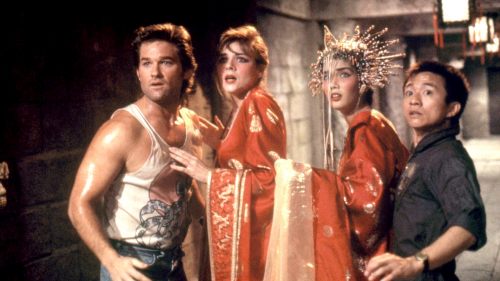The Solipsistic Imperialism Of Ego In GUARDIANS OF THE GALAXY VOL. 2
While watching Guardians of the Galaxy Vol. 2, I really perked up when Ego agreed that he was a god, little “g” notwithstanding. The mystery surrounding Ego’s intentions as Peter’s father was already intriguing, but this casual affirmation of his status as a higher power was unsettling. And it’s not like demi-gods and mystical entities who manipulate the laws of reality are unique to the Marvel Cinematic Universe (MCU), from the major players of reworked Norse mythology to Dr. Strange’s Dormammu. But Ego’s high opinion of himself undermined both his existence as a supposed god and his intentions as a father figure, suspicions that would come to reveal the most threatening, real-to-life MCU villain so far.
Ego’s backstory is both interesting and sad. Having randomly gained consciousness floating out in the middle of the cosmos, he manipulated the matter around him to terraform a planet surrounding his bright-blue brain. Eventually consumed with the idea that there had to be other life-forms in existence besides himself, he split his consciousness into a vessel that took the form of what he assumed was the most likely evolutionary form of humanoid life and set out for the stars. He found other life-forms, but was disappointed to discover that contrary to his expectations, most of life did not exactly resemble Ego himself. Life was complex, heterogeneous and imperfect, quite unlike the perfectly crafted planetary bubble that Ego had built around himself.
Ego eventually concludes that his seemingly random impulse to seek out life is actually a call to perfect it. So, Ego uses his vessel to travel from planet to planet, planting additional seeds of himself that would one day reform the surface of the planets he visited, and along the way he makes sure to fuck at least one woman per planet in the hopes that one of his “spawn” will inherit the gene necessary to gain access to his life force, which in turn would intensify his powers and allow him to unleash the planted seeds and remake the planets in his image. Ego is almost deterred from this self-incepted, self-perpetuated mission when he falls in love with Meredith, Peter’s mother. But instead of yielding completely to the strong emotional connection with the woman he loved, Ego plants a tumor into her head and kills her.
What makes Ego’s past and motivations so striking is how reminiscent they are of historical Western imperialism. Pods of white men leaving carefully crafted bubbles of society, seeking out new cultures while representing strict interpretations of civilization and religion, unable to accept the diversity and perspectives of different cultures, compelled by an ambiguous higher purpose to reform those cultures into their Western image, haunted by a loneliness stemming from the insecurities that come with the scary realization that life and culture is so much more different and complex than they realized, driving them to force resisting cultures to box themselves into their way of life. Even Ego’s hypocritical breeding with the cultures he judges so harshly to increase his power recalls the capitalistic motives that fueled imperialism. And Ego’s decision to kill the woman he loves in the name of his “purpose” reveals the necessary choice to suppress the emotional connections you make with others - which also suppresses the potential for empathy and understanding of points-of-view separate from your own - to set yourself apart and above, the instrument of a greater purpose, justifying the oppression, destruction and reformation of existing cultures. Ego is like the Western Imperialists he recalls: vain, immature, emotionally unprepared for the realities of life, so solipsistically obsessed with his interpretation of the universe that he can’t fully accept other perspectives.
That Ego wants so badly for Peter to aid him in his purpose is also telling, because it reveals the extent of his loneliness, his anxiety that but for Peter, most of the universe is unlike him. It also reveals the extent of Ego’s weakness. Despite his status as a Celestial, his power is limited and imperfect without Peter to pass it on.
This is why GOTG2’s concurrent emotional arcs are all so important. Yondu’s guilt for kidnapping and delivering Ego’s kids only for them to meet their deaths is redeemed by the relationship that he formed with Peter. Gamora’s increasing awareness of Nebula’s internal strife as the beginning of reconciliation between the sisters. Rocket coming to understand through Yondu that his mean-spiritedness is a way to deflect the pain brought to the surface whenever his interactions with friends contrasts so heavily with his memories of being tortured. They all work through the threats of fear, pain and isolation together, through renewed appreciation and understanding of perspectives, bonds of emotional trust that Ego would never even consider.
In a world of homogenized white super heroes, played by a group of homogenized white actors, circulated by a homogenized white movie industry, who all determine the terms of engagement for minorities through the establishment of social guidelines those minorities are pressured to follow to gain social currency, the word “legacy” comes to mind. Guardians of the Galaxy Vol. 2 is a refreshing change of pace, not just because of a wide cast of characters played by actors from different ethnicities, but also because of the idea, through the relationship between Peter and Ego, that this kind of homogenized power and influence is something that is passed on, and only as strong as the number of inheritors who continue to perpetuate it. Peter’s ultimate choice to reject Ego’s inheritance and “be like everyone else” is inspiring because it suggests that he took the time to actually consider the perspectives of and emotionally connect with everyone else.



